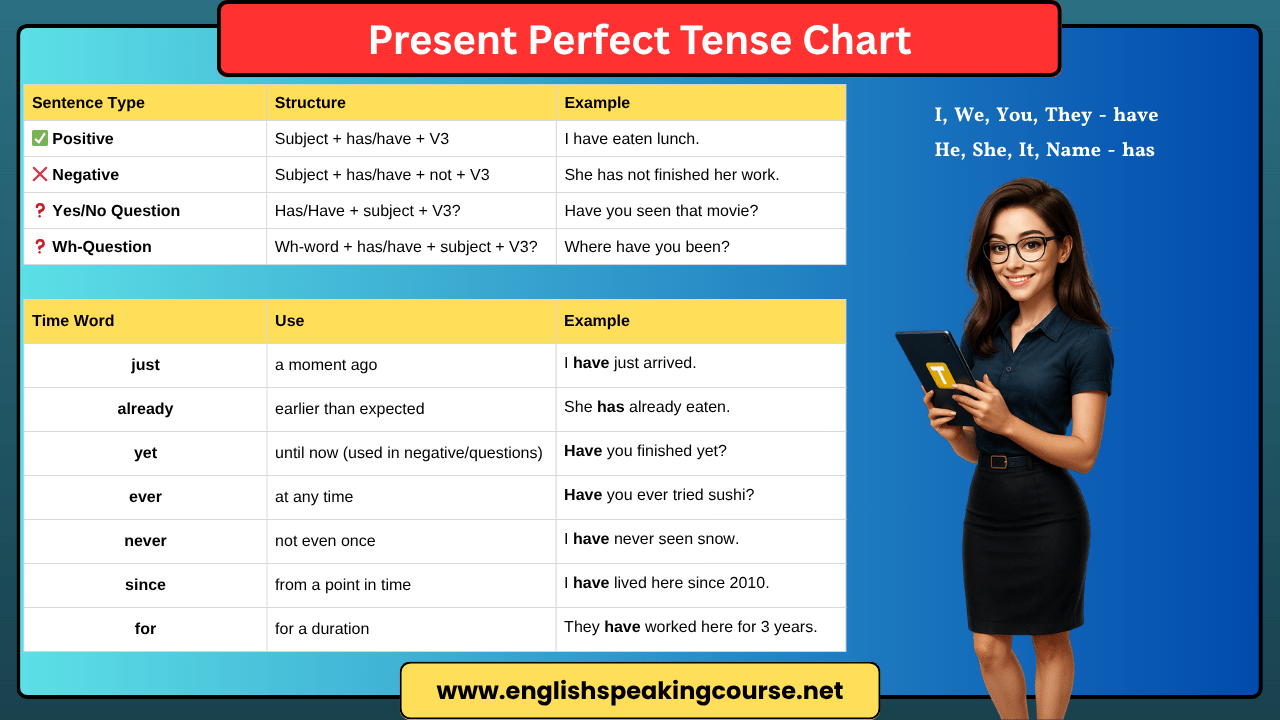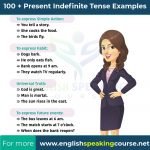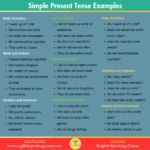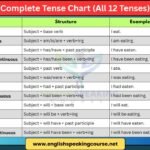Table of Contents
ToggleIntroduction to Present Perfect Tense
✅ What is Present Perfect Tense?
The Present Perfect Tense is used to talk about actions that happened in the past but are connected to the present. The exact time is not important, but the result or effect is still there now.
👉 Example:
I have lost my keys.
(You lost them in the past, but now you can’t find them.)
✅ Why is it important in English?
Present Perfect Tense is very common in daily English conversations. It helps us:
- Talk about experiences
- Share news
- Talk about unfinished actions
- Show the effect of past actions in the present
If you want to speak English more naturally, you must know how to use this tense correctly.
✅ When do we use it?
We use Present Perfect Tense when:
- The time is not exact or not important
➤ Example: She has visited London. (We don’t say when.) - We want to show the result now
➤ Example: He has broken his leg. (Now he can’t walk.) - We talk about things that started in the past and are still true
➤ Example: I have lived here for 5 years.
Present Perfect Tense Structure (Formula)
The Present Perfect Tense is formed using has/have + past participle (V3) of the main verb.
Let’s break it down into 3 main sentence types:
✅ Positive Sentence Structure
Formula:
🔹 Subject + has/have + past participle (V3) + object
Examples:
- I have eaten lunch.
- She has finished her homework.
- They have gone to the market.
- He has played football.
📝 Use “has” with: He, She, It, Name
📝 Use “have” with: I, We, You, They
✅ Negative Sentence Structure
Formula:
🔹 Subject + has/have + not + past participle (V3) + object
Examples:
- I have not eaten lunch.
- She has not finished her homework.
- They have not gone to the market.
- He has not played football.
💡 Short forms:
- have not = haven’t
- has not = hasn’t
➡️ Example: I haven’t seen that movie.
✅ Question Sentence Structure
Formula (Yes/No questions):
🔹 Has/Have + subject + past participle (V3) + object?
Examples:
- Have you eaten lunch?
- Has she finished her homework?
- Have they gone to the market?
Formula (Wh- questions):
🔹 Wh-word + has/have + subject + past participle (V3)?
Examples:
- What have you done?
- Where has he gone?
- How have they managed it?
🔗 Explore More English Grammar Topics:
Helping Verbs Used (Has / Have)
In Present Perfect Tense, we always use a helping verb (has or have) before the past participle (V3) of the main verb.
✅ When to Use Has and Have:
- Use has with singular third-person subjects
(He, She, It, or any singular name) - Use have with I, We, You, They and plural subjects
📊 Subject-Wise Usage Table:
Subject | Helping Verb |
I | have |
We | have |
You | have |
They | have |
He | has |
She | has |
It | has |
Rahul | has |
My parents | have |
The students | have |
📝 Examples:
- I have completed the project.
- She has cooked dinner.
- They have watched the movie.
- Rahul has read that book.
- You have helped me a lot.
Using the correct helping verb is important to make your sentence grammatically correct.
Common Uses of Present Perfect Tense
The Present Perfect Tense connects the past and the present. We use it in many real-life situations. Let’s look at the most common uses with simple examples.
✅ 1. To Show Past Action with Present Result
This use shows something happened before, but its effect or result is still important now.
🔹 Example:
- I have lost my phone.
👉 (I lost it before, and now I don’t have it.) - She has broken her leg.
👉 (She broke it earlier, and now she can’t walk.)
✅ 2. To Talk About Life Experiences
We use Present Perfect to talk about things we have done in life, but we don’t say exactly when.
🔹 Example:
- I have visited the Taj Mahal.
- They have never eaten sushi.
- Have you ever flown in an airplane?
📝 We often use: ever, never, once, twice, many times
✅ 3. To Describe Actions Just Completed
This shows that the action happened a short time ago, and we often use the word just.
🔹 Example:
- He has just finished his homework.
- I have just received your message.
- They have just arrived.
💡 “Just” means a moment ago.
✅ 4. To Describe Actions that Happened in an Unspecified Time
When the exact time is not mentioned or not important, we use Present Perfect.
🔹 Example:
- I have read that book.
- We have met before.
- She has cleaned the room.
⛔ We don’t use Present Perfect with specific time words like “yesterday,” “last year,” or “in 2010.”
✅ But we can use it with already, yet, ever, never, etc.
Present Perfect Tense with Time Words
Certain time words are commonly used with Present Perfect Tense. These words help express when or how recently something happened — but without giving an exact time.
Let’s look at the most common ones and how to use them.
✅ 1. Just – a short time ago
🔹 Examples:
- I have just finished my homework.
- She has just left the office.
📝 “Just” is used between have/has and the past participle (V3).
✅ 2. Already – something happened earlier than expected
🔹 Examples:
- We have already eaten dinner.
- He has already done his work.
📝 “Already” is usually used in positive sentences and placed between have/has and the verb.
✅ 3. Yet – until now
🔹 Examples:
- Have you finished your homework yet?
- I haven’t called him yet.
📝 “Yet” is used in questions and negative sentences, and it usually comes at the end of the sentence.
✅ 4. Ever – at any time in your life
🔹 Examples:
- Have you ever seen the ocean?
- Has she ever visited London?
📝 “Ever” is mostly used in questions, especially about life experiences.
✅ 5. Never – not at any time in your life
🔹 Examples:
- I have never eaten sushi.
- He has never been to a zoo.
📝 “Never” is used in positive structure but gives a negative meaning.
✅ 6. Since – from a point in the past till now
🔹 Examples:
- I have lived here since 2015.
- She has worked in this company since January.
📝 Use “since” with a specific point in time (year, day, date).
✅ 7. For – for a duration of time
🔹 Examples:
- We have known each other for 10 years.
- He has studied English for 6 months.
📝 Use “for” with a period of time (hours, days, years, months).
20+ Example Sentences in Present Perfect Tense
Let’s look at some easy and useful Present Perfect Tense sentences. These are perfect for beginners who want to speak English in daily life.
✅ 🔈 Sentences for Speaking Practice:
- I have finished my homework.
- She has gone to the market.
- They have eaten all the cookies.
- He has washed the car.
- We have seen that movie before.
- You have improved your English a lot.
- I have spoken to him already.
- My parents have traveled to Delhi.
- He has written three books.
- The teacher has checked our copies.
✅ 🏠 Daily Use Situations:
- I have lost my keys.
- Have you called the doctor?
- She has cooked dinner.
- We have cleaned the room.
- They have just arrived home.
- I have never tried Chinese food.
- He has just left the office.
- Have you ever visited Kolkata?
✅ ✏️ Short and Simple Examples:
- I have eaten.
- He has gone.
- We have played.
- She has come.
- They have left.
- You have done well.
These examples are easy to remember and perfect for your daily speaking practice. You can make your own sentences by following this pattern:
👉 Subject + has/have + V3 + object
Present Perfect vs Simple Past
Many learners get confused between Present Perfect Tense and Simple Past Tense. Let’s understand the difference in meaning and see some examples side by side.
✅ 📌 Difference in Meaning:
Present Perfect Tense | Simple Past Tense |
Focus is on the result or experience | Focus is on the time the action happened |
Time is not exact or not mentioned | Time is known and mentioned clearly |
Often used with: just, already, yet, ever, never, since, for | Often used with: yesterday, last week, in 2020, two days ago |
Action has connection with present | Action is completed in the past |
✅ 📝 Examples Side by Side:
Present Perfect | Simple Past |
I have eaten lunch. | I ate lunch at 1 PM. |
She has gone to the market. | She went to the market yesterday. |
We have seen that movie. | We saw that movie last night. |
He has finished his homework. | He finished his homework two hours ago. |
They have lived here for 5 years. | They lived here in 2015. |
I have never tried sushi. | I tried sushi last month. |
✅ Summary:
- Use Present Perfect when time is not specific, and the result is still important now.
- Use Simple Past when the action is completed, and the time is clear or in the past.
Common Mistakes and How to Avoid Them
Understanding Present Perfect Tense is easy, but many beginners make simple mistakes. Let’s look at the most common ones and how to fix them.
❌ Mistake 1: Confusing Present Perfect with Simple Past
Many learners use Simple Past when they should use Present Perfect — especially when the time is not mentioned.
🔻 Wrong:
I ate breakfast. (No time is mentioned, so Present Perfect is better)
✅ Correct:
I have eaten breakfast.
📝 Tip: Use Present Perfect when time is unspecified and result is important now.
❌ Mistake 2: Wrong Use of Has/Have
Learners often mix up has and have with the wrong subjects.
🔻 Wrong:
She have gone to school.
I has seen that movie.
✅ Correct:
She has gone to school.
I have seen that movie.
📝 Tip:
- Use has with: He, She, It, Name
- Use have with: I, We, You, They
❌ Mistake 3: Forgetting to Use Past Participle (V3)
Some learners use the base form or past form instead of the past participle (V3).
🔻 Wrong:
I have go to the market.
He has ate lunch.
✅ Correct:
I have gone to the market.
He has eaten lunch.
📝 Tip: Learn the three forms of verbs (go–went–gone, eat–ate–eaten).
Always use the third form (V3) in Present Perfect Tense.
✅ Final Tip:
✅ Formula reminder:
Subject + has/have + past participle (V3)
Practice Exercise Section
To master Present Perfect Tense, you need practice! Below are 3 simple types of exercises to help you learn faster and more confidently.
✍️ A. Fill in the Blanks (Use: has/have + V3)
- She _______ (complete) her homework.
- I _______ (see) that movie already.
- They _______ (not arrive) yet.
- _______ you ever _______ (visit) the Taj Mahal?
- He _______ just _______ (leave) the office.
✅ Answer Key:
- has completed
- have seen
- have not arrived
- Have, visited
- has, left
✍️ B. Make Sentences Using Present Perfect Tense
Use the clues to make correct sentences.
- I / finish / my project
→ _______________________________ - She / never / try / sushi
→ _______________________________ - We / already / clean / the room
→ _______________________________ - They / not / call / me
→ _______________________________ - He / just / arrive
→ _______________________________
✅ Sample Answers:
- I have finished my project.
- She has never tried sushi.
- We have already cleaned the room.
- They have not called me.
- He has just arrived.
✍️ C. Choose the Correct Form
- He (has/have) gone to school.
- I (has/have) seen that show.
- They (has/have) already left.
- She (has/have) not arrived yet.
- We (has/have) just eaten.
✅ Answers:
- has
- have
- have
- has
- have
These exercises are perfect for beginners. You can practice daily to improve your speaking and writing skills in Present Perfect Tense.
Helpful Tools to Learn Tense Easily
Learning grammar becomes fun and fast when you use the right tools. Here are some highly recommended products that can help you understand and practice Present Perfect Tense better at home.
📘 1. Recommended English Grammar Book
If you’re confused about tenses, especially Present Perfect, then a good grammar book is your best friend. This book explains tenses in simple English with examples, practice questions, and exercises.
✅ Why you’ll love it:
- Beginner-friendly language
- All tenses covered
- Self-practice tests included
👉 Check out this English Grammar Practice Book on Amazon
🎧 2. English Learning Audio Device
Struggling with pronunciation or listening practice? Try using a smart audio device or Bluetooth speaker while listening to English lessons, YouTube videos, or podcasts.
✅ Why it’s useful:
- Hands-free learning
- Clear sound for listening practice
- Helps improve speaking and listening
👉 Explore Bluetooth Speakers for English Learning
👉 Check this Smart Speaker with Alexa – your speaking buddy!
🪑 3. Comfortable Study Tools for Better Focus
A quiet, organized, and comfortable study space can boost your learning speed. Using tools like a study chair, lamp, or laptop table helps you stay focused.
✅ Must-have items for learners:
These tools can turn your study time into a productive and enjoyable routine.
📌 Pro Tip: Use the grammar book for writing, the audio device for listening, and the study tools for better concentration — and you’ll master Present Perfect Tense much faster!
FAQ – Present Perfect Tense
Here are some common questions English learners often ask about Present Perfect Tense. Let’s clear the confusion with easy explanations!
❓1. What is the difference between Present Perfect and Past Perfect?
✅ Present Perfect talks about a past action that has a connection to the present.
✅ Past Perfect talks about a past action that happened before another past action.
Examples:
- Present Perfect: I have eaten lunch. (Now I’m not hungry.)
- Past Perfect: I had eaten lunch before she arrived. (Both actions happened in the past.)
❓2. Can we use Present Perfect with specific time?
❌ No, we should not use Present Perfect with specific past time (like yesterday, last year, in 2010).
Wrong:
- I have seen the movie yesterday. ❌
Correct:
- I saw the movie yesterday. ✅
(Use Simple Past with specific time.)
✅ Use Present Perfect with unspecified time or time words like:
- already, just, yet, ever, never, since, for
❓3. How to use “since” and “for”?
Both are used in Present Perfect to show how long something has happened.
🟩 Since – use with a point in time (starting point)
Examples:
- I have lived here since 2015.
- She has worked here since Monday.
🟩 For – use with a period of time (duration)
Examples:
- I have lived here for 5 years.
- She has worked here for 3 days.
📝 Tip:
- Use since = from WHEN?
- Use for = for HOW LONG?
Conclusion
✅ Summary of Key Points:
- Present Perfect Tense is used to talk about past actions with a present connection.
- The structure is: Subject + has/have + past participle (V3)
- Use it with words like just, already, yet, ever, never, since, and for.
- Do not use it with specific past time like “yesterday” or “last week.”
- Common mistakes include confusing it with past tense, using the wrong verb form, or misusing “has/have.”
💡 Final Tips to Master Present Perfect Tense:
- 👉 Learn the V3 forms of common verbs (eat → eaten, go → gone, see → seen).
- 👉 Practice speaking with short, daily-use sentences.
- 👉 Listen to native speakers using this tense in movies or English podcasts.
- 👉 Use a good English grammar book and tools to make your learning easier.
🛒 Want to study better?
Try using a Spoken English Book for Beginners or a Bluetooth Speaker to practice listening!
🚀 Encourage Regular Practice:
Remember, practice is the key to confidence! Don’t worry if you make mistakes — that’s how you learn.
Start using simple Present Perfect sentences in your daily life, like:
- “I have finished my work.”
- “Have you eaten?”
- “I have never tried that.”
Keep going. You’re doing great! 💪
🔒 Affiliate Disclosure
This post contains affiliate links. As an Amazon Associate, I earn from qualifying purchases. This means if you click on a link and purchase an item, I may receive a small commission at no extra cost to you. I only recommend products I genuinely believe will help English learners like you.




